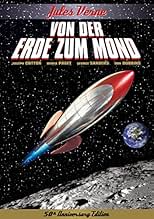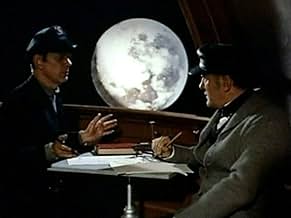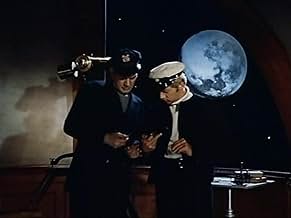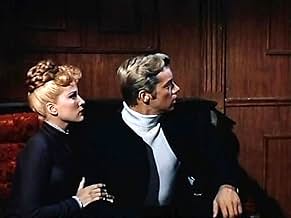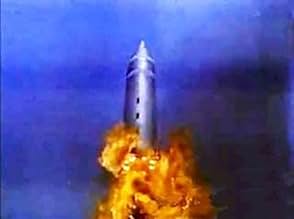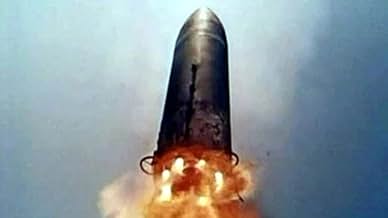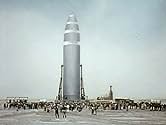IMDb RATING
5.1/10
1.9K
YOUR RATING
In 1868, American inventor Victor Barbicane develops a powerful military explosive that he also uses as fuel for a moon-bound rocket manned by himself and a motley crew.In 1868, American inventor Victor Barbicane develops a powerful military explosive that he also uses as fuel for a moon-bound rocket manned by himself and a motley crew.In 1868, American inventor Victor Barbicane develops a powerful military explosive that he also uses as fuel for a moon-bound rocket manned by himself and a motley crew.
Ludwig Stössel
- Aldo Von Metz
- (as Ludwig Stossel)
Morris Ankrum
- US President
- (uncredited)
Robert Clarke
- Narrator
- (voice)
- (uncredited)
Les Tremayne
- Countdown Announcer
- (uncredited)
Featured reviews
A scientist (Joseph Cotton) and a millionaire arms dealer (George Sanders) team up on the construction of a rocket to blast themselves to the Moon. This movie was based on a Jules Verne classic -- but it completely lacks the charm and the quality of `Journey to the Center of the Earth' and `20,000 Leagues Under the Sea'.
Even though the cast includes Morris Ankrum (the Grand Old Man of vintage sci-fi) to provide dignity, and Debra Paget to provide scenery (watch `Princess of the Nile' and go quietly insane), it wasn't enough to save this numbingly slow and unappealing film.
Some of the special effects are astoundingly bad, considering the fair production standards. In the scenes of the blast-off, the supporting bar which holds up the rocket model is clearly visible! Fans of `Forbidden Planet' will notice the heavy use of the `electronic tonalities' borrowed from that classic. Directed by Byron Haskins, who did both `War of the Worlds' and `The Conquest of Space'.
Even though the cast includes Morris Ankrum (the Grand Old Man of vintage sci-fi) to provide dignity, and Debra Paget to provide scenery (watch `Princess of the Nile' and go quietly insane), it wasn't enough to save this numbingly slow and unappealing film.
Some of the special effects are astoundingly bad, considering the fair production standards. In the scenes of the blast-off, the supporting bar which holds up the rocket model is clearly visible! Fans of `Forbidden Planet' will notice the heavy use of the `electronic tonalities' borrowed from that classic. Directed by Byron Haskins, who did both `War of the Worlds' and `The Conquest of Space'.
Certainly the effects of this film are no where near what we are used to today, but the inventiveness to even attempt to portray Vernes' rich imagination are secondary to the effort to bring such imagination from the page to the visual arts. There are inventive approaches to pre-real space travel, and the scientific accuracy (or real lack thereof) are secondary to the underlying Drama and dilemma presented about technological advances and the impact they have by affecting Man's commission of War upon his fellow man. So when watching this movie enjoy the players and do not cast aside because of reality fallacies and liberties taken in order to bring a book to visual life.
I got a real kick out of watching the hokey special effects. A space suit with a helmet that uses screws to hold it in place, and snaps up the front? How effective is that? And the odd contraption that spins the three sea-faring astronauts, and conveniently subsides in place for the first to regain consciousness to slide out of it, then rotate his two buddies in turn to exit the mechanism. I wondered who would start the thing back in motion upon re-entry
And the gyro scope! It reminded me of Jodie Foster in Contact, where she journeys through space and time in a similar invention. The extensive use of wood puts Starship Voyager to shame, and the lack of zero gravity (drinking wine to celebrate take off) is downright amusing.
But what really made the movie work for me, was the poetic language as Virginia Nicholl Debra Paget) realizes they are all going to die. We could live to we are really old, and die quietly in our sleep, but how much better to go out as star, a blazing star, for all the world to see! To which Barbicane replies, that if he ever gets back to Earth alive, he will make sure all future voyages will include a woman, for hope. How could they possibly have foreseen the catastrophic re-entry into Earth's atmosphere by Space Shuttle Columbia in February 2003? Where not just one but two women, Commander Laurel Clark and Dr. Kalpana Chawla joined five men in instant death. Sure, the parallels to Power X and atomic warfare were already obvious in 1958, but the simplistic plot tells a whole lot more. To quote a great man, 'The cause in which they died will continue. Mankind is led into the darkness beyond our world by the inspiration of discovery and the longing to understand. Our journey into space will go on.'
But what really made the movie work for me, was the poetic language as Virginia Nicholl Debra Paget) realizes they are all going to die. We could live to we are really old, and die quietly in our sleep, but how much better to go out as star, a blazing star, for all the world to see! To which Barbicane replies, that if he ever gets back to Earth alive, he will make sure all future voyages will include a woman, for hope. How could they possibly have foreseen the catastrophic re-entry into Earth's atmosphere by Space Shuttle Columbia in February 2003? Where not just one but two women, Commander Laurel Clark and Dr. Kalpana Chawla joined five men in instant death. Sure, the parallels to Power X and atomic warfare were already obvious in 1958, but the simplistic plot tells a whole lot more. To quote a great man, 'The cause in which they died will continue. Mankind is led into the darkness beyond our world by the inspiration of discovery and the longing to understand. Our journey into space will go on.'
The first half of this movie was surprisingly close to Jules Verne's novel of the same name. However, once the projectile begins heading to the moon, the plot changes significantly--and you can only assume it was because the studio was broke and keeping everyone in the sabotaged ship was a cost-savings measure. Ultimately, this RKO film was released by Warner Brothers because of the bankruptcy.
The story is set about 1870 in the United States. Mr. Barbicane (Joseph Cotten) is a munitions magnet who announces he's developed a super-explosive. His rival, Styvesant Nicholl (George Sanders) isn't impressed and says his metal plate can withstand anything...and soon after Barbicane blows the plate to pieces. So what is Barbicane going to do with the new formula, Power-X? He intends to use it to blast a projectile to the moon and back! Foolishly, Barbicane brings along his rival...not realizing Nicholl is a bit of a maniac!
For a going out of business film, it is surprising that one was made in color and actually looks good. It also has some decent actors in the script. But the film does suffer a bit here and there due to some lulls and the movie sadly just abandoned Verne's script halfway through the film. Decent and watchable but it could have been much more...especially if they'd geared up for a sequel as Verne had a follow-up book that continued the story.
The story is set about 1870 in the United States. Mr. Barbicane (Joseph Cotten) is a munitions magnet who announces he's developed a super-explosive. His rival, Styvesant Nicholl (George Sanders) isn't impressed and says his metal plate can withstand anything...and soon after Barbicane blows the plate to pieces. So what is Barbicane going to do with the new formula, Power-X? He intends to use it to blast a projectile to the moon and back! Foolishly, Barbicane brings along his rival...not realizing Nicholl is a bit of a maniac!
For a going out of business film, it is surprising that one was made in color and actually looks good. It also has some decent actors in the script. But the film does suffer a bit here and there due to some lulls and the movie sadly just abandoned Verne's script halfway through the film. Decent and watchable but it could have been much more...especially if they'd geared up for a sequel as Verne had a follow-up book that continued the story.
I feel tvholic's views are a bit harsh. It mustn't be forgotten that Verne wrote this in 1865 some thirty years before Wells wrote 'War of the Worlds". It must also be remembered that RKO was going broke at the time so special effects were not what they should have been. Stars Joseph Cotten and George Sanders did well with the script they had. Where this will not go down as a great sci fi movie, it is still an interesting one if for no other reason than the interplay between Cotten and Sanders.
Stories like War of the Worlds, 20,000 Leagues Under The Sea and Around the World in 80 Days have lent themselves to the use of special effects and unfortunately for this film, the film production company did not have the wherewithal to have effects in the same class as the aforementioned three.
Stories like War of the Worlds, 20,000 Leagues Under The Sea and Around the World in 80 Days have lent themselves to the use of special effects and unfortunately for this film, the film production company did not have the wherewithal to have effects in the same class as the aforementioned three.
Did you know
- TriviaSome of the music is actually the "electronic tonalities" created by Louis Barron and Bebe Barron for Forbidden Planet (1956).
- GoofsDespite dire warnings of death should occupants of the projectile NOT be in the "acceleration tubes" upon launch, no explanation is offered as to why Virginia isn't turned to goo by stowing away in another room.
- Crazy creditsOpening credits are on the pages of a book, with the leads' photos included above the name.
- ConnectionsReferenced in Trumbo (2007)
- SoundtracksElectronic Tonalities
(uncredited)
from Forbidden Planet (1956)
composed by Bebe Barron and Louis Barron
heard during the scenes on board the rocket
- How long is From the Earth to the Moon?Powered by Alexa
Details
- Release date
- Country of origin
- Language
- Also known as
- Von der Erde zum Mond
- Filming locations
- Production companies
- See more company credits at IMDbPro
- Runtime
- 1h 41m(101 min)
- Aspect ratio
- 1.85 : 1
Contribute to this page
Suggest an edit or add missing content


